The cinema world buzzes with anticipation for “Bob Marley: One Love,” a music biopic showcasing the reggae icon’s journey and cultural impact. The Cast of Bob Marley: One Love will be crucial in bringing the legendary musician’s story and vibrant world to the big screen.
Bob Marley’s influence on music and culture can’t be overstated. His melodies touched hearts across the globe, spreading messages of love, unity, and social justice. Now, a talented ensemble is set to portray the key figures in Marley’s life.
| Key Facts about ‘Bob Marley: One Love’ | |
| Director | Reinaldo Marcus Green |
| Release Date | February 14, 2024 |
| Production Companies | Paramount Pictures, Tuff Gong |
| Filming Locations | Jamaica, UK |
| Main Cast Size | 5 principal actors |
| Music | Re-recorded and original tracks |
| Budget | Estimated $70 million |
| Cinematography | Robert Elswit |
Kingsley Ben-Adir: Embodying the Soul of Bob Marley

At the heart of this biopic is Kingsley Ben-Adir, tasked with the monumental role of portraying Bob Marley himself. Ben-Adir’s performance is eagerly anticipated, given the challenge of capturing Marley’s unique spirit and charisma.
Ben-Adir’s preparation for the role was intense and multifaceted:
- He immersed himself in Marley’s music, studying not just the sound but the emotion behind each song.
- The actor worked with a dialect coach to perfect Marley’s Jamaican patois.
- Physical transformation included growing dreadlocks and adopting Marley’s distinctive stage movements.
- Ben-Adir spent months learning to play guitar to authentically portray Marley’s musicianship.
“Playing Bob was a spiritual journey,” Ben-Adir shared in a recent interview. “I felt a responsibility to honor his legacy and the profound impact he had on the world.”
Ben-Adir’s previous roles in “One Night in Miami” and “Peaky Blinders” have showcased his versatility as an actor. However, stepping into the shoes of a cultural icon like Marley presents a unique challenge. The actor spent time in Jamaica, absorbing the culture and meeting with people who knew Marley personally.
To capture Marley’s physicality, Ben-Adir underwent a rigorous training regimen:
- Daily yoga and meditation to embody Marley’s spiritual presence
- Extensive vocal training to mimic Marley’s singing style
- Studying hours of concert footage to replicate Marley’s on-stage energy
Ben-Adir’s commitment to the role extends beyond mere imitation. He delved deep into Marley’s philosophy, studying Rastafarianism and the political climate of 1970s Jamaica. This holistic approach aims to bring depth and authenticity to his portrayal of the reggae legend.
You might also like Andrea Canning’s Net Worth
Lashana Lynch: The Strength Behind the Legend
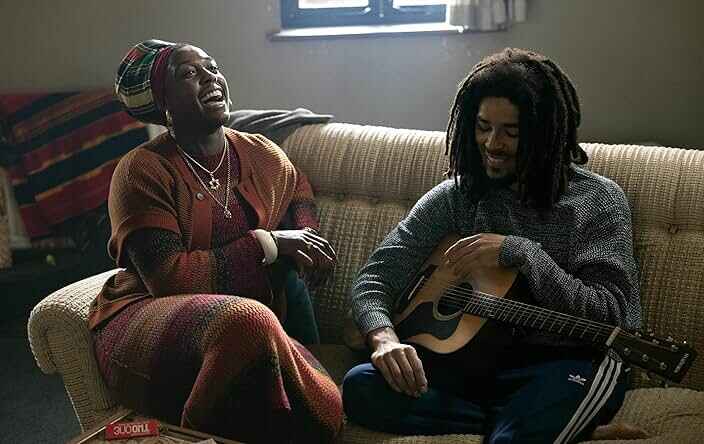
Portraying Rita Marley, Bob’s wife and musical collaborator, is Lashana Lynch. Her role is crucial in depicting the personal life and artistic partnership that shaped Marley’s career.
Lynch, known for her powerful performances in “No Time to Die” and “Captain Marvel,” brings depth to Rita’s character:
- She spent time with the real Rita Marley, gaining insights into her relationship with Bob.
- The actress learned to sing in the style of the I-Threes, Rita’s backing vocal group.
- Lynch’s portrayal explores Rita’s role in preserving and continuing Bob’s legacy after his death.
- She studied footage of Rita’s performances to capture her stage presence and vocal style.
“Rita Marley was not just a wife, but a force in her own right,” Lynch explained. “I wanted to show her strength, her musical talent, and her unwavering support for Bob’s vision.”
Lynch’s preparation also included:
- Intensive research into the history of reggae and its evolution
- Learning about Rita’s Afro-Cuban heritage and its influence on her music
- Understanding the complexities of being a woman in the male-dominated music industry of the 1970s
The actress worked closely with costume designers to ensure Rita’s iconic style was accurately represented, from her colorful headscarves to her flowing stage outfits. This attention to detail helps transport viewers to the vibrant world of 1970s Jamaica.
Lynch’s portrayal doesn’t shy away from the challenges Rita faced, including Bob’s infidelities and the pressure of balancing family life with a burgeoning music career. This nuanced approach aims to present Rita as a fully realized character, not just a supporting player in Bob’s story.
You might also like Mark Singer Gorilla Glue Net Worth 2024
James Norton: The Industry Insider
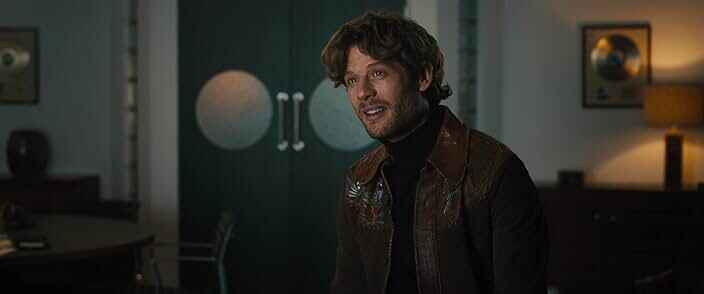
James Norton takes on the role of Chris Blackwell, founder of Island Records and a key figure in bringing Marley’s music to an international audience. Norton’s portrayal offers a glimpse into the business side of Marley’s career.
To prepare for the role, Norton:
- Met with the real Chris Blackwell to understand his perspective on Marley’s rise to fame.
- Studied the music industry of the 1970s, particularly the challenges faced by reggae artists.
- Worked on capturing Blackwell’s unique accent and mannerisms.
- Researched the history of Island Records and its role in popularizing reggae worldwide.
Norton’s character provides a counterpoint to Marley’s artistic journey, showcasing the complexities of bringing reggae to a global stage. The actor delved into the intricacies of music production and distribution in the pre-digital era, highlighting the innovative strategies Blackwell employed to market Marley’s music.
“Blackwell wasn’t just a businessman,” Norton notes. “He was a visionary who recognized the universal appeal of Bob’s music. My goal was to show his passion for the art form alongside his business acumen.”
The film explores the sometimes tense relationship between artistic integrity and commercial success, with Norton’s Blackwell walking a fine line between supporting Marley’s vision and making his music marketable to a wider audience.
Sheldon Shepherd: Artistic Vision and Friendship
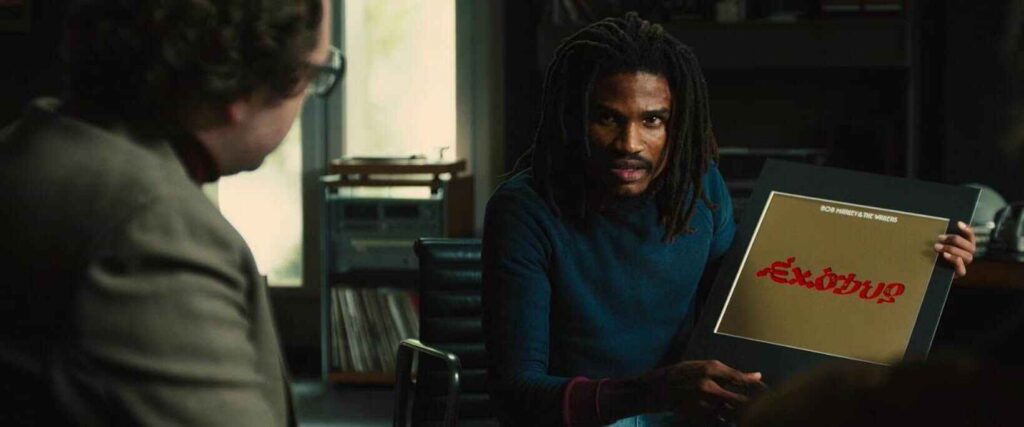
Jamaican actor Sheldon Shepherd brings authenticity to his portrayal of Neville Garrick, Marley’s art director and close friend. Shepherd’s background in Jamaican theater makes him uniquely suited to capture the cultural nuances of Marley’s inner circle.
Shepherd’s preparation included:
- Studying Rastafarianism and its influence on Marley’s art and lifestyle.
- Learning about graphic design techniques of the 1970s to understand Garrick’s work.
- Exploring the dynamics of Marley’s friendships and creative collaborations.
- Practicing the art of hand-lettering and illustration to authentically portray Garrick’s design process.
“Neville was Bob’s visual interpreter,” Shepherd noted. “He translated Bob’s music and message into powerful imagery that resonated worldwide.”
The director collaborated with cinematographer Robert Elswit on a visual style capturing 1970s Jamaica’s grit and Marley’s transcendent performances. The Cast of ‘Bob Marley: One Love’ brings this world to life, embodying the film’s evolving color palette from warm, earthy tones to a vibrant, global aesthetic mirroring Marley’s journey.
Green’s direction explores intimate moments between music, delving into Marley’s relationships, spiritual journey, and political awakening. The Cast of ‘Bob Marley: One Love’ infuses these scenes with depth, crafting a well-rounded portrait beyond typical music biopics.
You might also like All About Blackout 2024
Umi Myers: Young Love and Early Inspirations
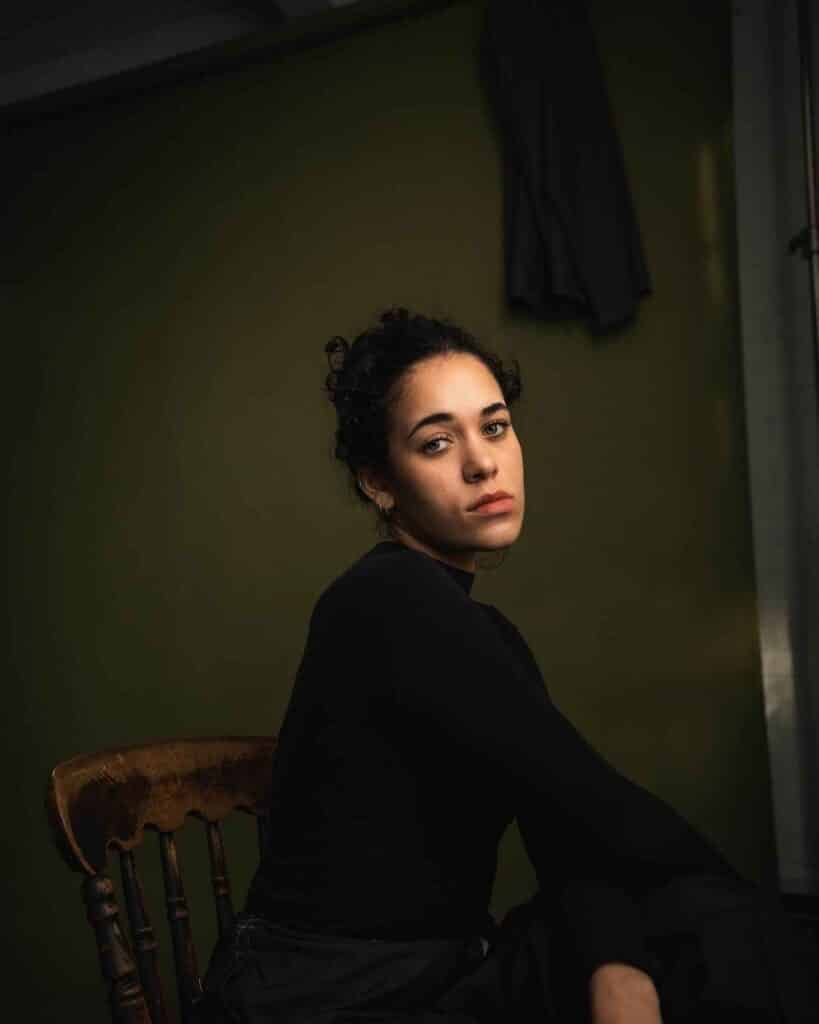
Newcomer Umi Myers takes on the role of Esther Anderson, Marley’s girlfriend during his early career. Myers’ portrayal offers a glimpse into Marley’s personal life and the inspirations behind some of his most beloved songs.
To bring Esther to life, Myers:
- Researched the cultural climate of 1970s Kingston.
- Studied photographs and footage of the young Bob Marley to capture the essence of their relationship.
- Worked with the costume department to authentically represent the fashion of the era.
- Learned about Anderson’s career as a filmmaker and her role in documenting Marley’s early years.
Myers’ performance as part of the Cast of ‘Bob Marley: One Love’ sheds light on a less-known chapter of Marley’s life, adding depth to the biopic’s narrative. The actress portrays Anderson as a multifaceted character, highlighting her artistic pursuits and influence on Marley’s developing worldview, enriching the film’s exploration of the reggae icon’s life..
“Esther wasn’t just Bob’s muse,” Myers explains. “She was an artist in her own right, and their relationship was a meeting of creative minds. I wanted to show that dynamic and how it shaped Bob’s early career.”
The film explores how Anderson’s perspective as an outsider (she was born in Jamaica but raised in England) brought a unique element to Marley’s understanding of his music’s potential global appeal.
Supporting Cast: The Ensemble Behind the Legend
The film boasts a rich supporting cast, each bringing crucial elements to the story:
- Anthony Welsh as Peter Tosh, co-founder of The Wailers
- Nadine Marshall as Cedella Booker, Bob’s mother
- Aston Barrett Jr. as Aston “Family Man” Barrett, Wailers bassist
- Tosin Cole as Bunny Wailer, founding member of The Wailers
- Umi Myers as Cindy Breakspeare, Miss World 1976 and Marley’s partner
These performers help to recreate the vibrant world of Jamaican music and culture that shaped Marley’s artistry. Each actor underwent extensive preparation to capture the essence of these real-life figures:
- Welsh studied Tosh’s militant stance and his role in shaping the early sound of The Wailers.
- Marshall delved into Cedella’s influence on Bob’s spiritual and musical development.
- Barrett Jr., being the son of the real Aston Barrett, brings a personal connection to his role.
- Cole explored Bunny Wailer’s complex relationship with Bob and his eventual departure from the group.
The ensemble cast works together to create a rich tapestry of relationships and influences that shaped Marley’s life and career.
Behind the Camera: Crafting a Visual and Sonic Journey
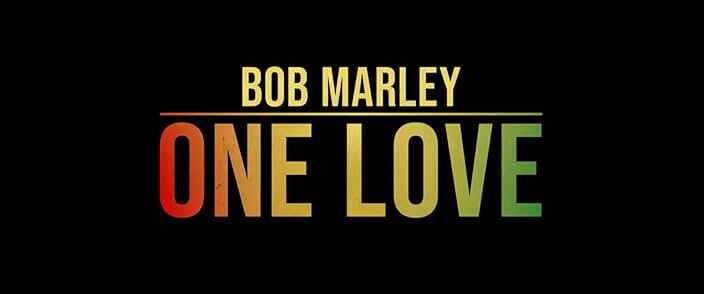
Director Reinaldo Marcus Green faced the challenge of bringing Marley’s story to the big screen with authenticity and passion. His approach included:
- Extensive collaboration with the Marley family to ensure accuracy.
- Meticulous recreation of 1970s Jamaica and London.
- Innovative techniques to blend original recordings with new performances.
- Using a mix of handheld and steady cam shots to create an immersive experience.
“We wanted to create a visceral experience,” Green explained. “Not just to see Bob’s life, but to feel the energy of his music and message.”
The director worked closely with cinematographer Robert Elswit to develop a visual style that captures both the gritty reality of 1970s Jamaica and the transcendent quality of Marley’s performances. The Cast of ‘Bob Marley: One Love’ inhabits this world, bringing authenticity to the evolving color palette that mirrors Marley’s journey, from warm, earthy tones to a vibrant, global aesthetic.
Green’s direction also focuses on the intimate moments between the music, exploring Marley’s personal relationships, spiritual journey, and political awakening. The Cast of ‘Bob Marley: One Love’ brings depth to these scenes, presenting a well-rounded portrait of the artist that goes beyond the typical music biopic format.
You might also like Avengers: Doomsday – Release Date
The Music: The Heartbeat of ‘One Love’
At the core of the biopic is Marley’s revolutionary music. The film’s approach to the soundtrack includes:
- Remastering of original recordings
- New performances by the cast
- Careful integration of music into the narrative flow
- Collaboration with contemporary artists to create remixes and interpretations of Marley’s classics
| Iconic Songs Featured in the Film |
| “No Woman, No Cry” |
| “One Love” |
| “Redemption Song” |
| “Buffalo Soldier” |
| “Exodus” |
| “Is This Love” |
| “Jamming” |
| “Get Up, Stand Up” |
Each song is treated not just as background music, but as a character in its own right, driving the story forward and providing emotional depth. The film’s music supervisor, Gabe Hilfer, worked closely with the Marley estate to ensure the authenticity of the musical performances.
“We wanted to strike a balance between honoring Bob’s original recordings and allowing our actors to bring their own interpretation to the performances,” Hilfer explains. “It’s about capturing the spirit of the music, not just mimicking it.”
The film also explores the evolution of Marley’s sound, from the early ska influences to the development of his signature reggae style. This musical journey is interwoven with the narrative, showing how Marley’s life experiences shaped his artistry.
You might also like the Cast of Thanksgiving, the Horror Hit of 2023
Impact and Legacy: More Than a Music Biopic
“Bob Marley: One Love” aims to be more than just a retelling of a musician’s life. It seeks to explore:
- Marley’s impact on Pan-Africanism and global unity
- The evolution of reggae from Jamaican roots to international phenomenon
- Marley’s spiritual journey and the influence of Rastafarianism on his music and message
The film doesn’t shy away from controversies, addressing:
- Political tensions in Jamaica during Marley’s rise to fame
- Personal challenges, including health issues and relationships
- The complexities of balancing artistic integrity with commercial success
Director Green emphasizes the film’s broader scope: “We’re not just telling Bob’s story, we’re exploring how his message of unity and love resonated across cultures and continues to inspire people today.”
The biopic delves into Marley’s role as a cultural ambassador, showing how his music bridged divides and brought attention to social and political issues. It explores his concerts in Zimbabwe shortly after the country gained independence, highlighting Marley’s commitment to African unity and empowerment.
Case Study: Recreating the ‘Smile Jamaica’ Concert
One of the film’s most anticipated scenes is the recreation of the ‘Smile Jamaica’ concert. This pivotal moment in Marley’s life showcases the power of music in the face of adversity.
Key aspects of this recreation include:
- Detailed set design to match the original concert venue
- Choreographed crowd scenes with hundreds of extras
- Intense rehearsals to capture the energy of Marley’s live performances
- Authentic period costumes and instruments
The ‘Smile Jamaica’ concert, which took place just two days after an assassination attempt on Marley, serves as a powerful symbol of his resilience and commitment to peace. The film’s recreation of this event aims to capture not just the music, but the tension and ultimate triumph of the moment.
Production designer Anastasia White describes the challenges: “We wanted to transport the audience to 1976 Kingston. Every detail, from the stage setup to the crowd’s attire, was meticulously researched and recreated.”
The scene also showcases the film’s approach to blending historical accuracy with cinematic storytelling. While staying true to the events, the filmmakers use the concert as a lens to explore Marley’s personal struggles and the political climate of Jamaica at the time.
The Jamaican Connection: Authenticity in Filmmaking
A key aspect of “One Love” is its commitment to authenticity, particularly in its portrayal of Jamaica and its culture. The production team made several crucial decisions to ensure this:
- Filming on location in Jamaica, including in Kingston neighborhoods where Marley lived and performed
- Employing local crew members and extras to bring genuine Jamaican flavor to the production
- Consulting with cultural experts to ensure accurate representation of Jamaican customs, language, and lifestyle
Jamaican-born actor Sheldon Shepherd, who plays Neville Garrick, speaks to the importance of this approach: “It’s not just about getting the accents right. It’s about capturing the spirit of Jamaica, the energy of the people, and the cultural context that shaped Bob’s music.”
The film also explores the contrast between Marley’s roots in Jamaica and his experiences in London, where he recorded some of his most famous albums. This juxtaposition helps illustrate Marley’s journey from local star to global icon.
The Rastafarian Influence: Spirituality and Music
Central to Marley’s life and music was his Rastafarian faith. The film dedicates significant screen time to exploring this aspect of Marley’s identity and its influence on his art.
Key elements of Rastafarianism portrayed in the film include:
- The importance of ganja (marijuana) as a sacrament
- The philosophy of “I and I” unity
- The reverence for Haile Selassie I of Ethiopia
- The use of dreadlocks as a spiritual expression
The filmmakers worked closely with Rastafarian advisors to ensure respectful and accurate portrayal of these elements. Actor Kingsley Ben-Adir underwent extensive education in Rastafarian beliefs and practices to authentically embody Marley’s spiritual journey.
“Understanding Bob’s faith was crucial to understanding his music,” Ben-Adir explains. “It wasn’t just a religion for him, it was a way of life that informed every aspect of his art and activism.”
The Women in Marley’s Life: Beyond the Music
While Bob Marley is the central figure of the biopic, the film also sheds light on the important women who shaped his personal and professional life:
- Rita Marley (played by Lashana Lynch): His wife and musical collaborator
- Cindy Breakspeare (played by Umi Myers): Miss World 1976 and mother of Damian Marley
- Cedella Booker (played by Nadine Marshall): Bob’s mother and early musical influence
The film explores these relationships with nuance, showing how each woman contributed to Marley’s growth as an artist and a person. It also addresses the complexities of Marley’s romantic life, including his multiple relationships and children.
Lynch, speaking about her portrayal of Rita Marley, notes: “Rita was not just a backing singer or a wife. She was a musician in her own right and a powerful force in Bob’s life. We wanted to show her strength and her own artistic journey.”
The Global Impact: Marley’s Music Across Borders
“One Love” doesn’t confine itself to Jamaica or even the Caribbean. It explores how Marley’s music transcended geographical and cultural boundaries to become a global phenomenon.
The film depicts key moments in Marley’s international career, including:
- His breakthrough performances in the UK
- The recording of the “Exodus” album in London
- His triumphant concert in Zimbabwe after the country’s independence
- The growing popularity of his music in Africa and Europe
Through these scenes, the biopic illustrates how Marley’s message of love, unity, and social justice resonated with audiences worldwide. It also touches on how his music influenced and was influenced by other genres, from rock to African pop.
The Political Landscape: Music as a Tool for Change
Marley’s life and career were inextricably linked to the political climate of his time. “One Love” doesn’t shy away from this aspect, exploring:
- The turbulent political situation in 1970s Jamaica
- Marley’s attempts to bridge political divides through his music
- The assassination attempt on Marley in 1976
- His involvement in Zimbabwe’s independence celebrations
The film portrays Marley not just as a musician, but as a reluctant political figure whose art became a powerful voice for change. It explores the tension between his desire to unite people through music and the reality of a deeply divided society.
“Bob wasn’t a politician, but his music had political power,” director Green notes. “We wanted to show how he navigated that responsibility and used his platform to promote peace and unity.”
The Legacy: Marley’s Enduring Influence
As the film draws to a close, it reflects on Marley’s lasting impact on music, culture, and social movements. The Cast of ‘Bob Marley: One Love‘ portrays how his message continues to resonate decades after his death, influencing new generations of artists and activists. Through their performances, the cast brings to life Marley’s enduring legacy and the timeless nature of his art and ideals.
The biopic touches on:
- The continuation of Marley’s musical legacy through his children
- The global popularity of reggae music today
- The use of Marley’s songs in social and political movements around the world
- The Bob Marley Foundation and its ongoing charitable work
Through interviews with contemporary artists and footage of Marley’s music being used in recent protests and celebrations, the film draws a line from the past to the present. The Cast of ‘Bob Marley: One Love’ brings these connections to life, portraying both historical figures and modern-day artists influenced by Marley. Their performances showcase the timeless nature of Marley’s art and philosophy, demonstrating how his legacy continues to inspire and resonate across generations.
Conclusion: One Love, Many Voices
“Bob Marley: One Love” represents a collective effort to honor the legacy of a musical legend. Through the talents of its diverse cast and crew, the film promises to offer a nuanced portrayal of Marley’s life and times.
As audiences prepare to experience this biopic, they can anticipate:
- A deep dive into the cultural and historical context of Marley’s music
- Powerful performances that bring iconic figures to life
- A soundtrack that will resonate with both longtime fans and new listeners
- A nuanced exploration of Marley’s personal life, spiritual journey, and political impact
The film’s release is set to reignite interest in Marley’s music and message, introducing a new generation to his enduring legacy. It serves not just as a celebration of one man’s life, but as a testament to the power of music to inspire, unite, and drive social change.
As Bob Marley himself once said, “One good thing about music, when it hits you, you feel no pain.” This biopic aims to hit audiences with the full force of Marley’s music and message, offering a cinematic experience that educates, entertains, and inspires.
FAQs
When will ‘Bob Marley: One Love’ be released? A: The film is set for theatrical release on February 14, 2024.
How much of Marley’s life does the movie cover? A: The biopic focuses primarily on Marley’s life from the early 1970s to his rise to international fame in the late 1970s, with some coverage of his early years and lasting legacy.
Are the actors doing their own singing in the film? A: While some actors perform their own vocals, the film also utilizes original recordings and professionally re-recorded tracks to maintain authenticity.
How involved was the Marley family in the production? A: The Marley family, particularly Rita Marley and Ziggy Marley, were closely involved in the film’s development, providing insights and ensuring accuracy.
What sets this biopic apart from other music documentaries? A: “One Love” combines dramatic recreations with archival footage and music, offering a uniquely immersive experience of Marley’s life and artistry. It also places strong emphasis on the cultural and political context of Marley’s career.
Will the film feature any unreleased Bob Marley music? A: While the film primarily focuses on Marley’s well-known hits, there are rumors of some previously unreleased recordings or alternate versions being included in the soundtrack.
How does the film address Marley’s Rastafarian faith? A: The biopic explores Marley’s spiritual journey in depth, showing how his Rastafarian beliefs influenced his music, lifestyle, and worldview.
As the release date approaches, anticipation builds for this cinematic exploration of Bob Marley’s life. “One Love” promises to be more than just a music biopic cast of bob marley one love – it’s a celebration of a cultural icon whose message of unity and love continues to resonate across generations, inviting audiences to experience the power of Marley’s music and message in a whole new way.